Camping is a popular summertime pastime and when done responsibly, can be a fun way to spend some quality time with the family. In the article, “Is Camping Safe? A Guide to Staying Safe“, the overall consensus is that yes it is provided you take precautions. In other words, it is the planning you do before you camp. However, many dangers can occur while camping that you should be mindful of!
Can you keep yourself protected while camping? Yes, you can. Planning is one thing, but what happens while camping is a completely different story. Not only do you need to be mindful of your personal safety and knowing your limits, but you also need to be mindful of others around you as well as certain areas where animals habitat.
How To Protect Yourself From Bears (and other animals) While Camping
Don’t Store Any Food In Your Tent
When camping it should be a no-brainer to not store food in your tent. However, many campers will do it anyway because it is easier to just sleep with it right there. This may include protein bars, candy wrappers, and any other food fragments.
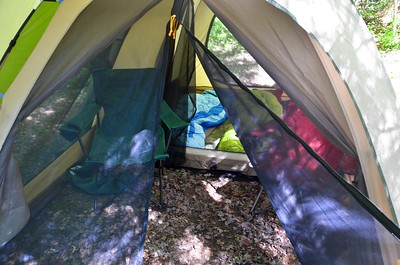
This is a bad idea and will just draw in bears, raccoons, squirrels, and other animals. Store all your food in airtight bags and/or hide them away from the campsite. However, if a bear or other animal smells your food and begins to try to get access to it, you could have a big problem on your hands.
So store all of your food in a bear-proof container and don’t keep it in your tent! It is also a good idea to cook away from your tent when possible. Don’t let the smokey scent of your food get trapped inside your tent.
Take Advantage Of Food Storage Containers
If storing food in your tent is a bad idea, you should store all of your food in a bear-proof container and don’t keep it in your tent. Bears will look for a trash can or food storage container to hunt for their food, so this should be avoided.
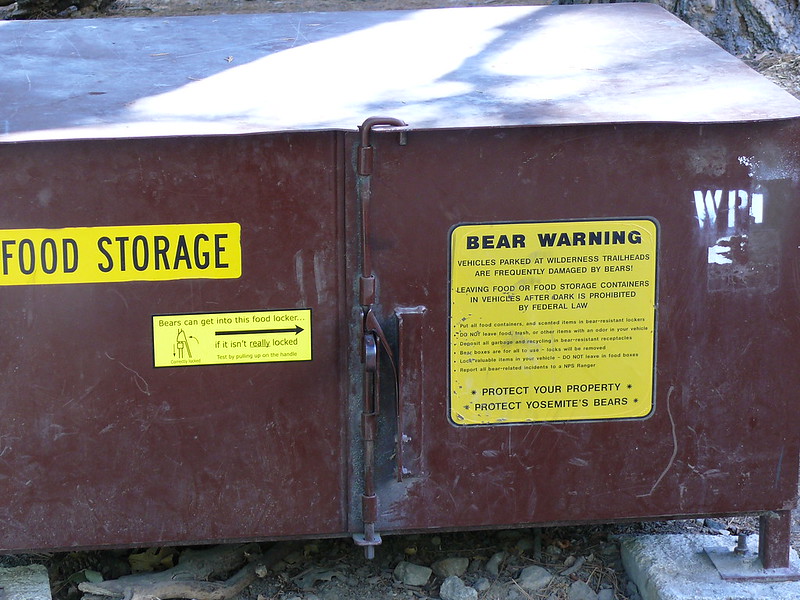
If you do have bears in the area, it is best to store your container at a distance from your campsite. When storing your food in a bear-proof container, make sure the container is locked and that there are no openings for an animal to get into it.
Store food properly in bear-resistant containers or hanging from trees at least 12 feet high and 10 feet from the trunk. Never leave food unattended. Bears will also look for any type of food that is unattended and will not hesitate to take it from an unsuspecting person. This could include people hiking by themselves or those who have accidentally left behind their food.
Don’t Sleep In The Open
As much as sleeping under the stars is a magical experience, it is also one that can be dangerous if you are not careful. When camping, it is best to sleep in a tent, RV, or trailer and avoid sleeping outside.
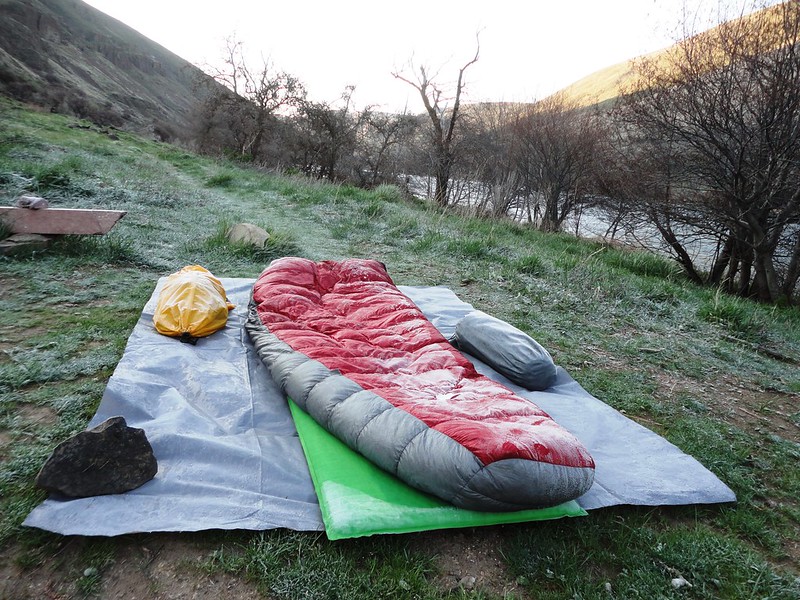
When you sleep in a tent, RV, or trailer, you are less likely to be seen. A bear may smell you, but not likely to see you. Plus there is less of a chance that they can get to you when you are locked in your camping equipment.
However, if a bear wants in it will find a way.
Change Your Clothes
Let’s face it, during a camping trip or hiking adventure you can get a bit smelly. This can be a combination of things. Sweat and cooking smoke can penetrate your clothing. You may have even rubbed up against bushes and shrubs from climbing in the outdoors.
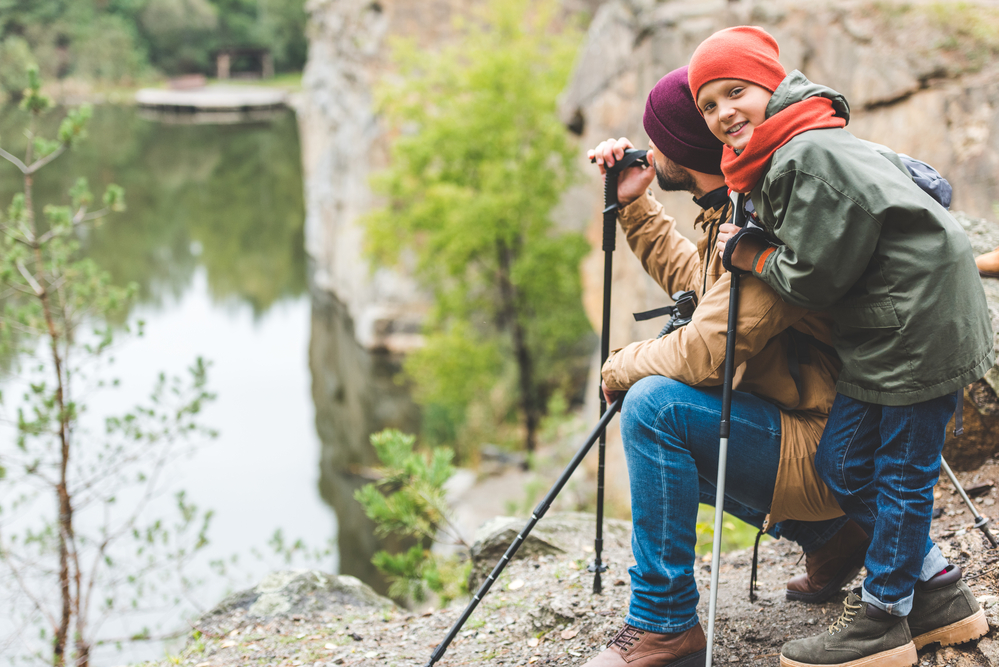
If that is the case, you may want to change your clothes while you are camping so that nothing smells bad. These smells can attract wildlife. It is wise to change them before going to bed each night. The article, “How To Stay Clean While Tent Camping“, has some great tips in keeping yourself clean while camping.
Also, avoid wearing any strong-smelling perfumes or colognes when hiking or camping.
Clean The Campsite (pots, pans, dishes)
Camp cleanliness is probably the best way to avoid unwanted animal visitors. You want to try to keep your campsite as clean and uncluttered as possible. Food scraps and trash should be thrown away in sealed containers.
Any cooking utensil, such as pots, pans, and cutlery should be washed thoroughly away from your campsite. Even the tiniest bit of food left behind can attract animals. Doing this not only removes the scent of that delicious meal you cooked but also removes any other smells that might be attracting the animals and insects like flies.
Bear Deterrents and Sprays
The bear deterrent is a device that deters bears from an area. The device emits a noise or smell that will drive bears away. This is a good way to protect your campsite from bear attacks. These include air horns and special noisemaking pistols. Noisemakers should are best from a distance to prevent a bear from getting close.
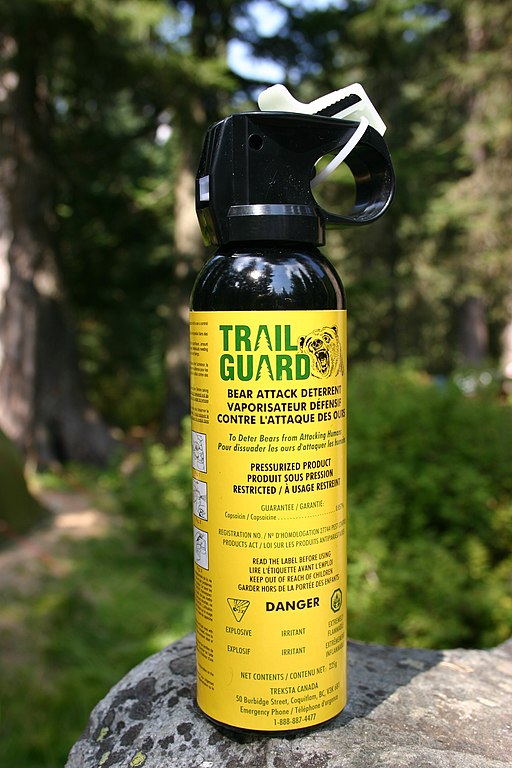
Bear spray is a lot like pepper spray. However, bear spray is made to deter bears by causing them to run from you. Like pepper spray, it is used at a much closer range than a noise-making deterrent. You must have bear spray on hand when hiking or camping as they can be a real threat to both hikers and campers.
Using a combination of both a noise-making deterrent and spray can keep a bear at bay.
How To Put Your Personal Safety First While Camping
When camping, there are many things to think about. Is where I’m camping safe? Do I have a plan in case there is an emergency? What if someone tries to break in or harm me while I sleep?
I have one word for you: pepper spray. Pepper spray should be a part of your safety kit when you go camping. It will give you the power to defend yourself and your family against an alarming situation. While it can’t protect you from everything, it will provide protection from animals and people who may want to cause harm. All you need to do is carry the pepper spray on your keychain or backpack for easy access, and as always, stay aware of what’s around you at all times while outside.
Be Alert
We often find ourselves around areas we know very well. That isn’t true when you go camping. You usually are heading to a new place for your adventure. You must remember to stay alert and be aware of your surroundings.
When you get to your campsite, pay attention to what is around you. Make note of exits, facilities, and even the amenities. You never know if you will need to leave in a hurry, barricade yourself in the restroom, or find water.
Staying alert also means listening for suspicious noises and if you hear something, investigate but with caution. You don’t want to go running into something that could harm you. Always be aware of what’s going on around you. Check-in with your family members every now and then when out in the wild to make sure everyone is safe.
Lock Your Doors
There are times when you think your campsite is protected. You’re in a campground that has people patrolling in golf carts. However, they don’t know everyone at the campground personally. They are mostly there to make sure the fire pits are clean, the restrooms are kept clean and well-stocked. They aren’t playing lookout and looking for trespassers.
When you do decide to leave for the day and you are leaving your vehicle, trailer, or RV behind make sure to lock your doors. You can also keep valuables locked in them as well. Since most vehicles have an alarm system, it will be very annoying for others at the campground to hear the horn blaring. It could even bring the camp hosts stopping by.
Know CPR/First Aid
While camping or hiking, you could be on your own in case of an emergency. You will need to know how to handle multiple situations. That’s why it is very important to know how to do CPR and different forms of first aid. This will increase your chances of getting someone medical attention quicker which could save a life!
Check out the American Red Cross to find training in your area.
Packing first aid kits is another great idea while camping. You can keep gauze and a small first aid kit in the vehicle or trailer. This way you can help patch up a cut or wrap a wound until you can get to a hospital.

There have been many a scraped knee when camping with kids. Especially if they bring a bike to ride.
Better With A Buddy/Partner
You can go camping alone. There are lots of people that enjoy being at one with nature and camping solo. But if that isn’t you then taking someone with you to share the experience is even better.
Having a partner can help out a lot while camping. You can split up to help carry gear and then you both can get started with setting up camp. If you are in a group of two or more, it’s easier to stay alert while camping especially if it is late at night. You will be able to take turns staying awake and look out for each other as well.
Self-Defense
Sometimes when camping in an unfamiliar site, it is good to peace of mind and bring along a self-defense aid. It should be lightweight, easily concealable, and easy to use. As stated above, pepper spray is one of the most efficient self-defense tools a person can carry.
It doesn’t take much effort to operate which is very advantageous for you when you are tired from hiking or feeling ill in any way. The only thing that needs to be done is pull the safety pin out or flip the switch and press the nozzle in the direction of an assailant’s face for it to start working.
A flashlight can also be helpful in an emergency. Flashlights can come in handy when you are looking for someone who has wandered off. They also help with visibility at night. As for protection, it can be used as a club to strike an intruder if needed.
If you plan on camping alone, it may be worth the time to invest in a self-defense class. especially if you plan on only solo camping. This way you will know what to do when someone approaches your campsite.
Let Others Know
Anytime you leave for a considerable amount of time, whether with a group or on your own, it is advisable to let others know your itinerary ahead of time. This way they know when you are slated to arrive and when will be back.
Whether it is a relative or trusted friend, give them all the important information in writing. This should include the campground’s name and phone number, your vehicle information, and even a copy of your driver’s license. The more communication you have with others, the better it will be in the case of an emergency.
How To Keep Yourself Safe While Camping
Stay Hydrated
With temperatures warming up and the air being a bit dryer, it is important that you stay hydrated. Dehydration can lead to headaches and fatigue as well as lead to a dangerous situation while you are camping and/or hiking.
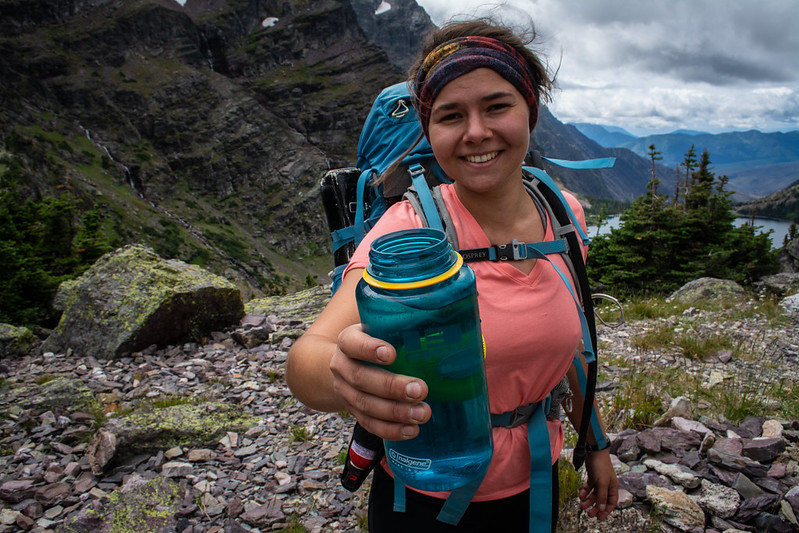
Always drink plenty of water, but it is also important to drink plenty of protein and electrolytes. A rule of thumb in regards to hydration is that you must drink a gallon per day per person. You should drink more if you are physically exerting yourself.
Avoid Alcohol
Alcohol can lead to dehydration, which is not a good thing if you are hiking or camping. You will be more susceptible to severe sunburn and exhaustion if you consume alcohol while camping.
Consuming excess alcohol while camping can lead to a lack of awareness and lower inhibitions. In other words, you can do stupid things which can cause you to get hurt or severely injured.
Regulate Body Temperature
Sometimes you just need to sit under a shady tree or awning out of the direct sunlight. Too much exertion can cause your body to overheat. Overheating can lead to a stroke or heat exhaustion.
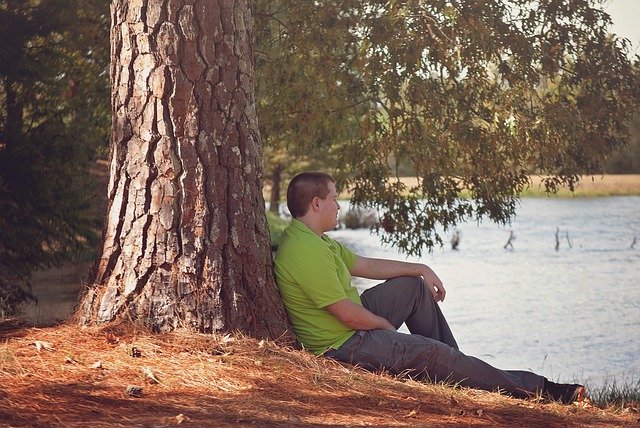
It is important that you take breaks while hiking, backpacking, and camping so that your body temperature does not get too hot. It is also a good idea to wear a hat, long sleeves, and pants while hiking or camping.
Allow Air To Flow
Whether you are camping in a tent, RV, or trailer, you want to make sure you have adequate airflow. Carbon monoxide poisoning is real.
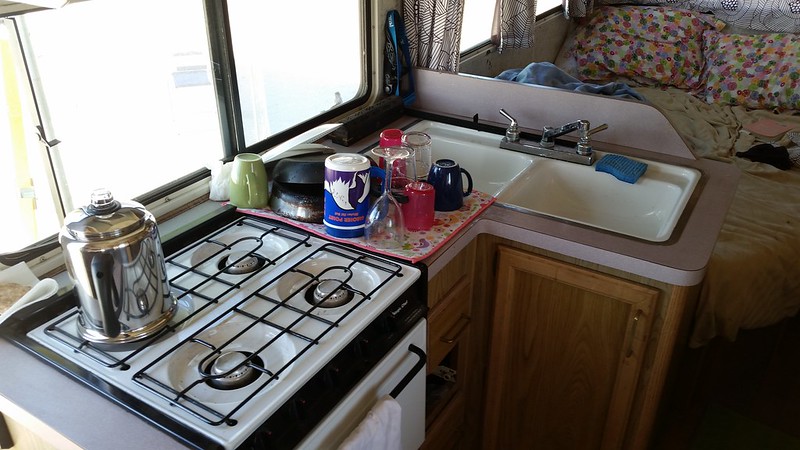
If cooking in your trailer or RV, make sure you have your windows and vents open. Opening the vents and windows helps to circulate air and it will also prevent things like smoke from getting into your vehicle.
If in a tent, don’t cook in it. Set up your cook station away and downwind of it. This will cause any fumes or smoke to not get trapped within.
Don’t Swim Alone
Whatever water source you may be near, it is always a great idea to never swim alone. Make sure there is at least one other person within eyesight. Wading through a river or swimming out in a lake may seem fun, and it is, but it is better when you have someone around to help just in case of an emergency.
Wrapping It Up
To have the safest time camping, following these tips can ensure you make every camping adventure safe. The key is to always be aware of your surroundings. Be smart about what you bring along on your adventures. Take the time to learn first aid and CPR. Follow the rules that are set up around your campground and make sure you have the proper safety and camping equipment.
Remember the goal of every good camping trip is to walk away with memories and return home safely.



